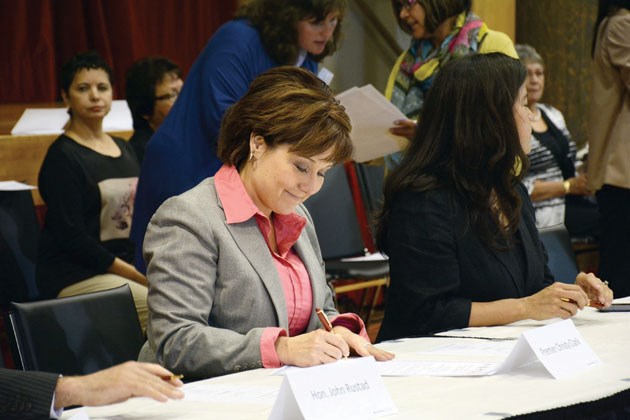Following decades of murders, disappearances and domestic abuse quietly suffered by Aboriginal women across the province, it's finally become a priority to stop it at its root causes.
In an effort to end violence against Aboriginal women and girls, on June 13, Premier Christy Clark, John Rustad, B.C. minister of Aboriginal Relations and Reconciliation, and First Nation leaders from communities and organizations across the province signed a memorandum of understanding at the First Nations Summit at the Chief Joe Mathias Centre of the Squamish First Nation.
B.C. is known for its Highway of Tears, the infamous Robert Pickton missing women's trial. B.C. also has the unfortunate distinction of having the most suspicious death and disappearance cases of Aboriginal women under the age of 31 in the country, according to the Native Women's Association of Canada. A recent RC MP report revealed there are more than 1,100 cases of murdered and missing Aboriginal women over the last 30 years in Canada - 225 remain unsolved.
"It is unacceptable that in this day and age, violence against women and girls, and in particular Aboriginal women and girls, is so prolific in our society," said Cheryl Casimer, member of the First Nations Summit political executive. "This MOU represents a much
needed collaborative effort for First Nations, Metis and the provincial government to come together and take concrete actions on stopping violence against Aboriginal women and girls."
Jody Wilson-Raybould, regional chief of the B.C. Assembly of First Nations regional chief, said her hope is the MOU goes beyond words and addresses the root causes of violence against Aboriginal women - poverty, inequality, and marginalization.
"(It's) symptomatic of a far greater social malaise that can only be addressed through true reconciliation and dealing with the underlying reality of the devastating colonial legacy," she noted. "Societies are judged by how well they treat their most vulnerable, and we are no different. We can and must do better."
At the meeting that saw hundreds of First Nation representatives - including from the Union of BC Indian Chiefs, Metis Nation and B.C.'s advisory council on Aboriginal women - Clark said a shared commitment to end the violence is the best way forward.
"We have a responsibility to create a world where all Aboriginal people can live without fear," she said. "This MOU demonstrates that government and Aboriginal organizations are working together to take positive actions to stop violence against Aboriginal women and girls wherever it occurs."
This past February, B.C.'s Provincial Domestic Violence Plan was released, which spans more than three years with $5.5 million available, including $2 million to deliver programs specifically for aboriginal women, men and children affected by domestic violence.
The provincial government is also committing $400,000 to the Giving Voice initiative, which aids Aboriginal communities in speaking out and taking action on this issue.



